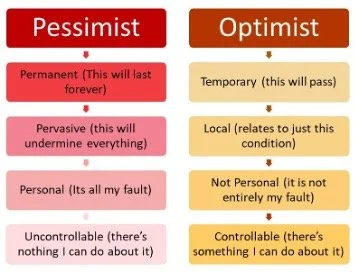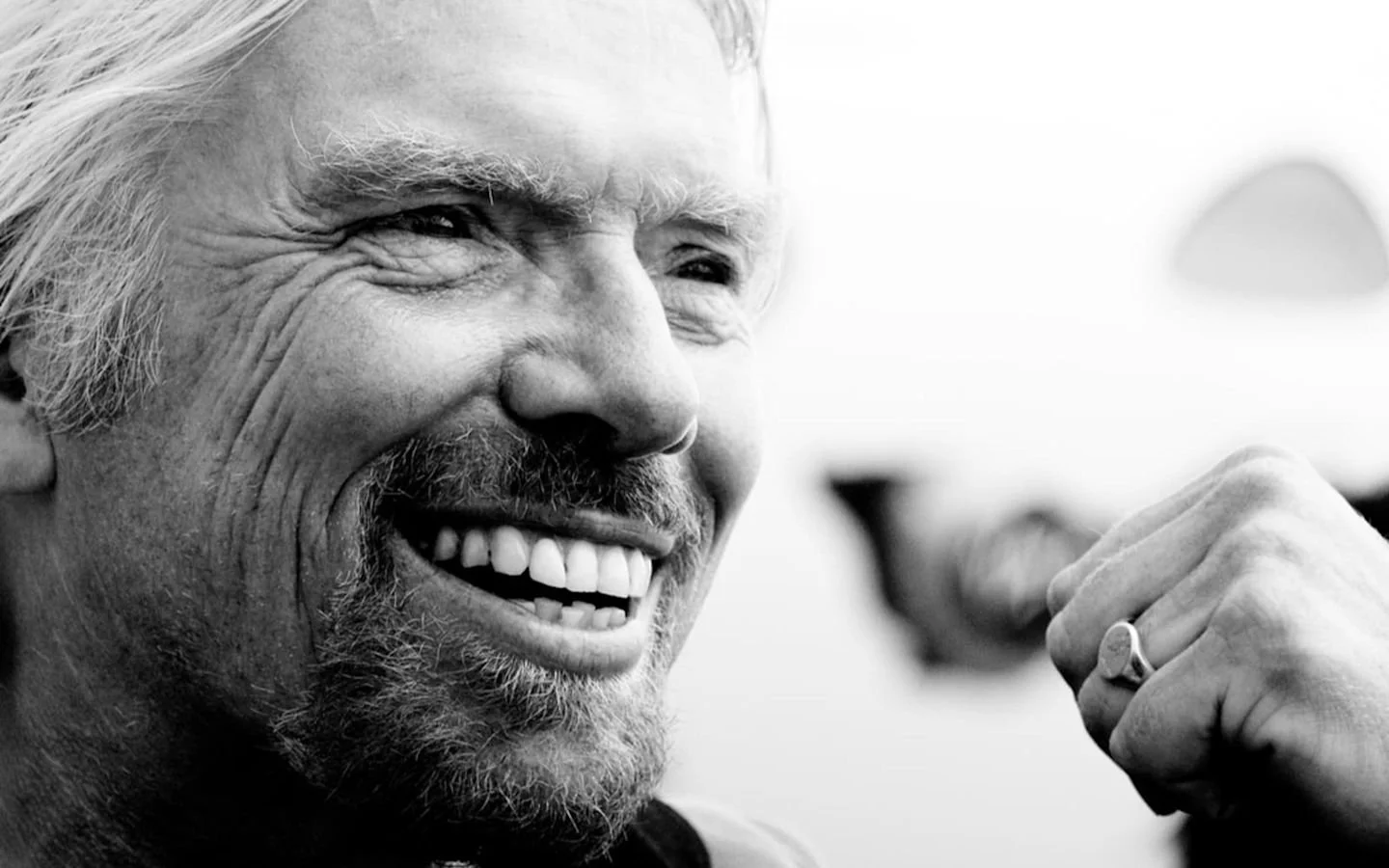
Gifts and Strengths of Seven
We can look at the gifts and strengths of type Seven with appreciation for the Sevens in our life and as something we can develop in ourselves. Ideally, we want to have flexibility and be able to access the gifts and strengths of all nine personality types when they are called for in the situation.
The gifts and strengths of each type are found at the healthy levels of the personality. Here the person is closer to their essence and their gifts and strengths express the essential quality. For the Seven this means their sensitivity to joy underlies their strengths.
Optimism, Enthusiasm
Sevens are optimistic people. Optimism is defined as: “The tendency to be hopeful and to emphasize or think of the good part in a situation rather than the bad part, or the feeling that in the future good things are more likely to happen than bad things”.
Optimism is a disposition or mindset that expects future “good things” to happen and a core personality trait that has been proven to be partly genetic.
Optimism is also considered to be an “explanatory style” or how we explain events. Optimists tend to think that if a positive event occurs it is because of their own actions and characteristics, and they see it as evidence that more positive events will likely occur in future and in other areas of their lives. Conversely, if a negative event occurs optimists see it as not their fault, isolated and unlikely to repeat in future. Pessimists reverse this explanatory style.
Here is an example of how the two styles of explanatory thinking play out when a negative event occurs:
Research has shown that optimism is associated with better health, greater achievement, less stress, and even greater longevity. Cognitive therapies and many books and resources exist to increase or learn optimism because of this connection to good outcomes. Note that we are not talking about excessive optimism, false or deluded thinking. Optimistic people can still be realists, they just respond differently to challenges and expect better futures. If you imagine a teenager suffering from the pessimistic kind of explanatory thinking -it’s all my fault and it’s going to last forever- it is easy to see how learning some more positive thinking skills might literally save a life.
“Optimism doesn’t mean that you are blind to the reality of the situation. It means that you remain motivated to seek a solution to whatever problems arise.”
The gift of Seven includes the mindset of optimism but goes further to the related quality of enthusiasm. Enthusiasm is defined as “intense enjoyment, interest, or approval” and is related to “playfulness, inventiveness, optimism and high energy.”
Sevens know how to enjoy life and its pleasures, to have fun and seek new experiences, to look to the future with enthusiasm. They will plan enjoyable activities, but they will also create fun in the moment spontaneously- they stay open to last minute changes and new possibilities. The hallmark Seven quality of enthusiasm includes this fun-loving, adventurous, and spontaneous spirit.
Sevens love to play and have fun which we will look at later, but for now let’s look at how optimism and enthusiasm impact Sevens in more serious ways. There is a freedom that comes from being optimistic and enthusiastic that flows into how Sevens choose what to do in life. If you believe things will go well and you have high energy, you are more likely to pursue what you really want in life with relish. Consider how you feel when you are enthusiastic about something and how you may discover direction from this feeling, as well as the energy to move forward.
Elaine Dundon writing in Psychology Today (Feb 6, 2022) describes the deep impact on our lives of genuine enthusiasm:
“Enthusiasm is essential for living a meaningful life. It’s not what we do in life (what job or relationship we have) but how we do it that matters. When we are inspired, we are open to new connections and have new thoughts and ideas. By engaging in life with genuine enthusiasm, we can interpret the people and experiences in our lives with new meaning, which, in turn, can make a big difference in the overall quality of our life.”
Notice the word genuine enthusiasm. We live in a society that tries to manufacture enthusiasm and excitement about products through marketing, in employees about their work and so on. We may feel we “should” show enthusiasm and be pursuing our “passions” but it can be an artificial, imposed agenda. Fake or forced enthusiasm is not what we are talking about when we describe the inner spirit of Seven- and perhaps contemplating Seven can help us understand the source of true enthusiasm.
The gift of natural enthusiasm Seven exemplifies comes from within- it is their upbeat, optimistic spirit and energy of enjoying life applied to whatever they choose to do. The energy flows from within and feels like greater freedom and excitement beckoning. There is no “should” or heaviness about it. It may lead to success and achievement but that is more a by-product than a goal. Really, Sevens are pursuing happiness. They invite us to look within and just see what we genuinely feel enthusiastic about.
The poet David Whyte tells the story of how he was utterly exhausted with work and asked his friend Brother David Steindl-Rast for advice. Brother David’s words led Whyte to embrace his life as a poet: “The antidote to exhaustion is not rest- it’s wholeheartedness.” In this way, enthusiasm connects to motivation and inspiration. Believing we can choose what we like and move towards what we are excited about is empowering, it invites whole-heartedness.
Versatile, Multi-Talented
Sevens enjoy variety and bring this to their life and career choices. They are busy and accomplished, they may be highly successful, usually with the flavour of being a generalist. Multi-talented and versatile, they are more likely to rise through various roles and organizations than to “climb the ladder.” They may move around both geographically and between fields of work. They also bring their versatility to their interests outside of work, seeking adventure and variety in their lives generally.
Extensive research by Robert Kaiser has found that versatility is the most valuable trait a leader can have in the modern environment of fast-paced change and disruption. This is because a versatile leader can use different, even opposite approaches as needed:
“The wider a leader’s lens on the world, the larger their repertoire of skills, abilities, and behavior, and the broader they are as a person, the more likely they are to lead their people, teams, and organizations to success in a rapidly changing world.”
Sevens naturally develop these qualities of being “broader” as a person, having a larger “repertoire” of skills and behaviors, and a wider “lens on the world”, because they enjoy moving around and doing different things in life. Sevens become versatile because they enjoy change, they find fun and energy in variety, they like to try new things and aren’t afraid to take risks. This naturally leads them to more varied experience and develops their many talents. It’s interesting to reflect on the connection to what is now considered the most valuable leadership trait.
Visionary, Innovative, Futurist
Sevens have a gift for envisioning the future - they see potential directions that may be taken, opportunities for growth, change and innovation. Their vision allows them to move forward, take risks and dream big. Sevens might be entrepreneurs or work in a role that requires future visioning, but whatever work they do they will bring their gift for innovating. They will see opportunities and possibilities and inspire others.
Let’s look at the way two famous entrepreneurs thought to be Sevens went about building their vision- Richard Branson and Steve Jobs. Of course, not all Sevens are such larger-than-life figures, but they exemplify the Seven’s innovative fun approach.
Richard Branson is a self-made billionaire, high school dropout, and the hugely successful founder of Virgin Group. Starting with Virgin Records, Virgin Airlines and now Virgin Galactica which sells flights in space, his businesses employ more than 50,000 people in more than 50 countries.
The story of how Branson started an airline is typical of his approach. He was stranded in Puerto Rico when his flight to the British Virgin Islands was cancelled. Branson rented a plane and went around the airport with a chalkboard sign that offered a “Virgin Airlines” one-way flight for $39- the cost of the rental divided by the number of seats on the plane. He filled the plane with all the bumped passengers, and this led to his idea for creating a customer-service focused airline.
These quotes from Branson capture his adventurous and bold approach to business and life:
“If somebody offers you an amazing opportunity but you are not sure you can do it, say yes – then learn how to do it later!
Life is a helluva lot more fun if you say yes rather than no.
As soon as something stops being fun, I think it’s time to move on. Life is too short to be unhappy. Waking up stressed and miserable is not a good way to live.
Business isn’t about ties, suits and briefcases. It’s about adventure.
You’ve got to take some risks and stand out from the crowd if you’re building a company. As long as you’re not hurting anyone and doing it in a fun way.
If you’re going to start a company, don’t take yourself too seriously.”

Steve Jobs is harder to type on the Enneagram and if you look this up, you will see him typed as possibly a One (perfectionist), a Four (design genius), a Five (tech genius) a Seven (what we will look at below) and an Eight (aggressive boss).
Considered as an exemplar of type Seven, Jobs embodies the inventive, futurist, multi-talented genius. His story is described by Walter Isacsson in the Harvard Business Review (April 2012) as the entrepreneurial creation myth writ large: Steve Jobs cofounded Apple in his parents’ garage in 1976, was ousted in 1985, returned to rescue it from near bankruptcy in 1997, and by the time he died, in October 2011, had built it into the world’s most valuable company. Along the way he helped to transform seven industries: personal computing, animated movies, music, phones, tablet computing, retail stores, and digital publishing.
Here is how Isaccson describes Job’s counter-culture approach:
Jobs stayed hungry and foolish throughout his career by making sure that the business and engineering aspect of his personality was always complemented by a hippie nonconformist side from his days as an artistic, acid-dropping, enlightenment-seeking rebel. In every aspect of his life—the women he dated, the way he dealt with his cancer diagnosis, the way he ran his business—his behavior reflected the contradictions, confluence, and eventual synthesis of all these varying strands.
Here are some Steve Jobs quotes that sound like a Seven:
You can’t connect the dots looking forward; you can only connect them looking backwards. So you have to trust that the dots will somehow connect in your future.
Sometimes when you innovate, you make mistakes. It is best to admit them quickly, and get on with improving your other innovations.
Your time is limited, so don’t waste it living someone else’s life.
When you grow up you tend to get told that the world is the way it is and your job is just to live your life inside the world. Try not to bash into the walls too much. Try to have a nice family life, have fun, save a little money. That’s a very limited life. Life can be much broader once you discover one simple fact: Everything around you that you call life was made up by people that were no smarter than you. And you can change it, you can influence it… Once you learn that, you’ll never be the same again.
It almost doesn’t compute for the rest of us how a wild lifestyle, adventurous spirit, and focus on having fun can result in such huge success. It challenges our ideas about conventional schooling, career paths and so on. But we can understand the energy that comes from enjoying what we do, and we can appreciate the ability to follow a future vision. From the standpoint of innovation their success makes perfect sense.
These Seven qualities can be expressed in many life settings not just entrepreneurship. Let’s look at an exemplar of Seven from the field of spirituality- the unique vision of Ram Dass and the wild way he got there.
Ram Dass, the famous spiritual teacher, was thought to be a Seven. Spiritually enlightened, guru, teacher, his original book Be Here Now brought Eastern meditation and yoga to the west and sold millions. Where his journey took him is clearly beyond personality- yet his life story can be seen as very Sevenish- very adventurous to say the least. Ram Dass reported that he had over 400 acid trips and “thousands” of sexual experiences- he identified as gay later in life, but these were with both men and women.
In his early days as Dr. Richard Alpert, he was a professor at Stanford and Harvard enjoying a lot of academic and material success. But at some point, he felt “caught in some kind of a meaningless game in which the students were exquisite at playing the role of students and the faculty were exquisite at playing the role of faculty…but nothing was happening. I felt as if I were in a soundproof room”. In the face of this “feeling of malaise”, he “ate more, collected more possessions, collected more appointments and positions and status, more sexual and alcoholic orgies, and more wildness in my life.” Then he started experimenting with psychedelics along with Timothy Leary, under the auspices of Harvard, which got them fired.
It's hard to fathom just how wild they were. At one point Ram Dass said: “I took five people and we locked ourselves in a building for three weeks and we took 400 micrograms of LSD every four hours. That is 2400 micrograms of LSD a day.… We finally were just drinking out of the bottle.… We were very high.” Yet the turn to a spiritual life began here: “It was a very frustrating experience, as if you came into the kingdom of heaven and you saw how it all was…and then you got cast out again”.
Ram Dass journeyed to India, found his guru, returned to the west with his message, Be Here Now and became a beloved spiritual teacher. Later in life he suffered a stroke which he called Fierce Grace. It is interesting for us to consider his journey as one of a Seven, from wild adventures and excess to finding the bliss of the moment.
“When the faith is strong enough, it is sufficient just to be. It’s a journey towards simplicity, towards quietness, towards a kind of joy that is not in time. It’s a journey that has taken us from primary identification with our body and our psyche, on to an identification with God, and ultimately beyond identification.”
Playful, Fun-Loving
It would be possible to name humour as a gift of Seven, as we did with Six. Both types are funny and between them cover most comics. The fast, zany type of humour of Robin Williams, Mike Meyers, Bette Middler, Cameron Diaz and Jim Carrey is the flavour of Seven humour. Jimmy Fallon and Conan O’Brien are Seven late-night hosts.
But for a fun strength of Seven let’s look at how they are playful and fun-loving.
Humans naturally play. Babies laugh and play from a very young age. We are familiar with the value of play for children and know that play is an important part of how they learn. Even animals play. And sometimes we play best when we play with children and pets.
Dr. Stuart Brown is the founder of the National Institute for Play and author of the book Play: How it shapes the brain, opens the imagination, and invigorates the soul. You can watch his Ted talk and check out his website. Without attempting to define play (which he says is like explaining a joke) Dr Brown describes the properties of play as: apparently purposeless, voluntary, inherently fun, free – we lose track of time, it makes us feel diminished self-consciousness, it has improvisational potential, and we desire its continuation and will invent new means to make it last.
Brown says that it is these properties of play that make play the essence of freedom. He says the things that tie us down and constrain us, like a job we hate doing, the need to meet demands, follow rules, and please other people, are what make us miserable. In play, these things are eliminated. Play is its own reward. The activity is inherently enjoyable.
Sevens have a natural talent for play and enjoyment- they like adventures, travel, food, games- anything that brings pleasure. They also create fun spontaneously. They live more freely than most of us in the way they allow themselves to have fun and play. In a way they stay younger longer and are less serious. Why do adults tend to outgrow imagination, fun and play?
Have you heard of the famous marshmallow test that was given to children to predict success? It has to do with deferred gratification- the ability to wait and discipline the self now for future gain. The children had a choice to have one marshmallow now or wait 15 minutes and have two. Those who waited were supposed to be more successful in later life. You can read about the study and how it has been somewhat debunked online if you are interested to know more. The main thing to note is how powerful this idea of deferred gratification for future success is culturally. Most of us have been trained into this belief system- don’t eat the marshmallow now. Or maybe you can have one later after you finish your homework. It’s as if we are in training to be glum.
As the amount of time we spend working has expanded and stress has intensified, we play less. We may think of fun as something we do on vacation or in structured activities like hobbies. As adults we can be inhibited about spontaneous play.
Play comes in unlimited forms but let’s think about dance as an example. Think of how dancing has been restricted in some religions because it is associated with the slippery slope of sin. Remember the movie Footloose? It seems we humans can fear too much fun or too much freedom- where will it all lead? This may not be our conscious belief, but it may still influence our behaviour- the Puritan within.

Dr. Peter Lovatt is a British psychologist who studies the mental health benefits of dance – he is known as Dr Dance and his book is called The Dance Cure. Check out his website which includes lots of information about the science of why humans dance, the psychological benefits, and his program to get us moving.
Sevens know how to get up and dance- they just pursue happiness naturally. They make fun a priority in how they live and give themselves permission to play. Perhaps for the rest of us it is about giving this permission, remembering the joy of play, and cutting loose more often. If we feel inhibited as adults, we can practice allowing and choosing more dancing.
Dancing is more than a way to play and be happy- it can be connected to the divine. Now we can see the ultimate potential of play. Remember the bliss of Being we said that Sevens are sensitive to? Sufi dancers whirl as a moving meditation to commune with the divine.
To Be Alive
To be alive: not just the carcass
But the spark.
That's crudely put, but…
If we're not supposed to dance,
Why all this music?
~Gregory Orr















